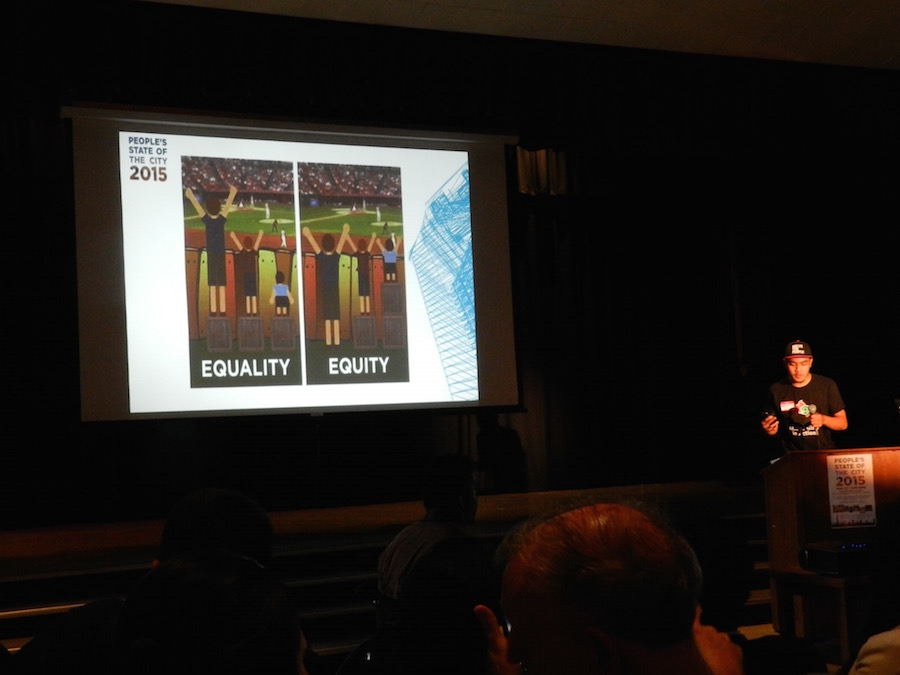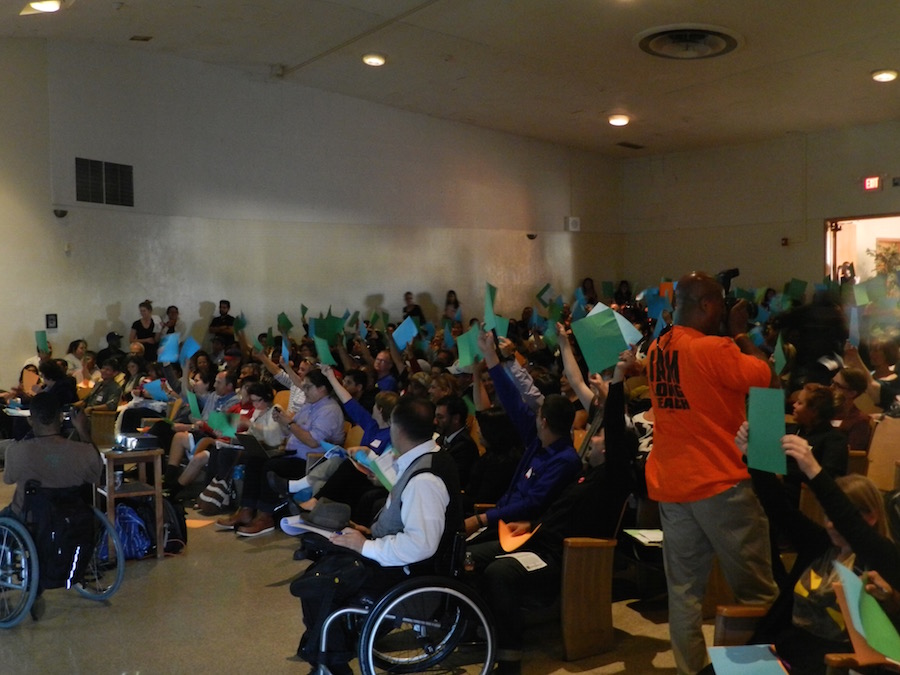
Members of the Long Beach Rising coalition passing out information before the People’s State of the City. Photos by Jason Ruiz
The buzz was palpable immediately upon entering the gates of the north entrance to Stephens Middle School on Colombia Street.
Community groups advocating for issues ranging from worker’s compensation to empowering Khmer women were tabling outside the auditorium where plays and music recitals are typically held. But on this night, there would be no tubas, intermissions or cellos. Instead, a dialogue covering a melody of issues facing everyday residents in Long Beach was on the docket. This was the 2015 People’s State of the City.
Everything from the venue, to the store-bought turkey wraps placed on a fold-up table for attendees, to the handwritten name badges handed out, distanced itself from the catered hors d’oeuvres and Broadway singers employed at Mayor Robert Garcia’s update of the city in January. People from seemingly every district gathered inside the jam-packed auditorium at Stephens to hear about their city, how it was affecting them and what they could do help reverse course.
The program put on by Long Beach Rising, a coalition of community advocacy groups, brought together ordinary citizens and a host of elected officials including council members, representatives from state senators’ offices, school board officials and the mayor himself.
Seventh District Councilman Roberto Uranga played de-facto host, as the location of the event sits within the district he represents. But his connection to the People’s State of the City has a much more familial tie. His wife, Tonia, was one of the first people to help put the event together as a way to gauge the community and harvest their perspectives.
“When you look a community that’s succeeding, you have to take a pulse of that community,” Uranga said. “And how do you take the pulse of a community? You do it by having events like this. I hope that we can report out some of the very positive things that we’re doing, but even better, very positive things that we’re going to do, where we’re going to take the city in the future.”
 Twenty-year-old Corleone Ham lent his eloquence and passion to the event, serving as the master of ceremonies and wasted little time diving into the issues.
Twenty-year-old Corleone Ham lent his eloquence and passion to the event, serving as the master of ceremonies and wasted little time diving into the issues.
Ham started in on equity and equality, telling his own tale of being raised by a single mother for the majority of his upbringing. Using the metaphor of a box to stand on, he pointed out that some people don’t need a box, as they can stand on their own. If the city is truly going to strive for equity, he said, it will have to realize that some people may require several boxes, but raising up one part of the city betters it as a whole.
“I think that Long Beach has been really progressive in trying to change the narrative of [how] our story is told,” Ham said. “I think it’s really great to see that we’re able to come together at the People’s State of the City and show that while there are different districts, organizing different things. There are so many intersections between the communities that we can really make a difference if we come together.”
Ham handed off the presentation to Ernesto Rocha, a community organizer for Clean and Safe Ports with the Los Angeles Alliance for a New Economy (LAANE), who bounced from topics including poverty, wage theft, pollution and environmental justice and immigration. Audience members were given three colored pieces of construction paper to help vocalize where they stood on the issues.
The most striking part of Rocha’s presentation was when he produced a PowerPoint slide with a pay stub of a truck driver from the Port of Long Beach. While he lauded the city’s recent passage of a project labor agreement that will hire locally, Rocha turned to his attention to the group of people his group works the closest with. Drivers, which until recently had been categorized as independent contractors and thus subject to a multitude of additional taxes, were the focus of Rocha’s wage theft argument. The audience gasped as he demonstrated how a $975 gross pay check was reduced to a take-home amount of just over $12.
“Wage theft should not happen in this beautiful city of mine,” Rocha said as the crowd unanimously held up blue sheets of construction paper to signal their support of for better jobs and a living wage.
Rocha, who immigrated to the United States in the 1990s and attended Stephens as a middle school student, said that in order to address immigration fairly, the humane element needed to be reintroduced to the equation.
“Immigration means that I’m a migrant,” Rocha said. “That I came from someplace. I’m not just a statistic, I’m not just an eight-year-old that just happened to get to the US. I matter and my family’s story matters.”
 While the presentation deviated in delivery from the mayor’s address, Mayor Garcia did touch on a lot of the situations the community organizations centered on during their State of the City. How to make the Port more green, addressing the unemployment issue in those communities where it is disproportionately high and educational justice were a few things that both parties seemed to agree needed some work. But what was painted with a large brush in January was distilled down to those who are actually being affected by the Promise Zone in Central Long Beach, the closure of New City School and the lack of living wages in the city.
While the presentation deviated in delivery from the mayor’s address, Mayor Garcia did touch on a lot of the situations the community organizations centered on during their State of the City. How to make the Port more green, addressing the unemployment issue in those communities where it is disproportionately high and educational justice were a few things that both parties seemed to agree needed some work. But what was painted with a large brush in January was distilled down to those who are actually being affected by the Promise Zone in Central Long Beach, the closure of New City School and the lack of living wages in the city.
Rocha said it was an important step for so many people that community members voted into office to be present and not only hear, but feel how the issues that are being discussed are actually affecting real people in their city. He said that while the slides depicting the elevated level of pollution and its corresponding health effects are powerful on their own, it becomes even more moving when those people who are affected by projects like the SCIG Rail Yard and the potential expansion of the 710 Freeway are in the same room as the elected officials that will eventually vote on those matters.
“I think it’s an incredible turnout of our elected officials,” Rocha said. “That they have their ear in the community and want to hear how we bring up the issues. I think it’s one thing to acknowledge that the issues are there, but it’s another to really feel it, really understand where it comes from and the stories behind them.”
The council will have a quick turnaround on one of the topics discussed during the presentation; one of the member-groups of the coalition will bring its constituents to City Hall Tuesday, June 2 in an effort to sway the council into voting in favor of more comprehensive and punitive protections for tenants against “slumlord” landlords.
A short skit meant to shine light on the plight of hotel workers, including the long hours and low pay they receive, interjected the standing-room only crowd with a shot of emotion. Before the actors took the stage to act out the verbal abuse, extended work days and potential threat of sexual and physical abuse hotel workers face at the hands of their customers, the father of hotel worker Claudia Sanchez took the stage and asked through an interpreter that prayers be sent her way. Sanchez is a hotel worker who recently was found unresponsive in the parking lot of the Renaissance hotel and is currently in a coma.
 Yunique Pettigrew, a resident of the Sixth District, said the appearance nearly brought her to tears. She said the topic of hotel worker conditions struck a chord with her.
Yunique Pettigrew, a resident of the Sixth District, said the appearance nearly brought her to tears. She said the topic of hotel worker conditions struck a chord with her.
“When you go to work you shouldn’t feel like your life is in danger, like you’re going to be abused at your job,” Pettigrew said. “Nobody should have to work that many hours and not get overtime. They get up everyday to do the job but get paid minimal. That’s unacceptable.”
Eliciting responses was only part of the agenda for the coalition of community groups that organized the event last night. The emotion invoking demonstrations are fruitless if community members remain in the dark as to how they can get involved and make a difference according to the young emcee, Ham.
“The point of the event is to get youth and community members involved, and understanding how organizations are organizing for change and how they can be part of it,” Ham said. “Some of the biggest takeaways is to build community.”
In order to do that, the low voter turnout, which sits around 15 percent citywide, is going to have to experience some dramatic changes. Nikole Cababa, an organizer with the Filipino Migrant Center stated the “future was still dim” if those who are currently not expressing their voices at the polls on election night continue that trend. In closing the ceremony, Cababa implored those in attendance to join a campaign that moved them during the presentation, to advocate for something that they feel passionate about.
“If we’re impacted by these issues, whether it be by the environment, immigrant rights or affordable housing, those most impacted need to be part of the solution,” Cababa said. “They need to be part of the process and in a meaningful and real way.”

